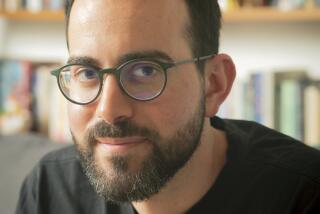What’s the Matter With the Antimatter?
- Share via
Philip, an anthropologist, loves Alice, a physicist; but Alice no longer loves Philip. She loves Lack, instead.
Lack is an experiment in futurist physics. Sitting in the laboratories of a university super-collider, it is a constructed void, a wormhole that makes all matter or energy fed into it vanish, transformed into the matter and energy of an alternate universe.
That, at least, is the plan of professor Soft, the Nobel Prize-winning chief of the particle-physicist team to which Alice belongs. But the brilliant scientific success that opens Jonathan Lethem’s blithe parable--a mix of academic spoof and philosophic sporting event--is marred. Lack is complete, but its miniature anti-universe refuses to detach from ours. Also, it throws up.
It is Alice’s fault, or rather, as clarified later by a visiting Italian physicist, it is the fault of the very nature of things. Reality, he explains, requires an observer, a consciousness, if it is going to perform all the hard work that is involved in being. The Soft team did the physics to create Lack, but it couldn’t do the consciousness. Alice, for some reason--she stood closest, perhaps, or was the most vulnerable--is annexed by Lack as its observer and tether.
Furthermore, following modern physics’ fun-house principle that to observe a phenomenon is to alter it, she involuntarily becomes the shaper of Lack’s very nature. As the scientists feed an assortment of objects into the device, it only devours--i.e., shifts into its alternate universe--some of them. Some it pushes back onto the lab floor.
It takes argyle socks, lightbulbs, “The Hunting of the Snark,” fertilized duck eggs and Alice’s (and Philip’s) apartment key. It rejects paper clips, dimes, peas, adhesive labels and eggbeater blades. The former are things that Alice likes; the latter, things she dislikes.
And it is time to get back to Philip.
He is the narrator, the battered lover, the confused humanist remnant in a dismaying scientific world--and no match for the powerful allure of a high-tech void.
Alice is besotted with her void--and it rejects her. She tries feeding in her hair, several self-portraits and, eventually, her whole body, and the only result is an ignominious dumping on the lab floor.
It is a paradox; one of Lethem’s sharpest ingenuities. Alice’s passionate attraction to Lack is due to the fact that it incorporates all of her qualities and tastes. But--the postmodern “but,” the low self-esteem “but,” the “but” of our up-to-date insecurities and screw-ups--she rejects herself. And Lack rejects her.
As Philip flails helplessly, crossing paths with an absurdist pair of blind physicists and having a near-affair with their sexy and uninhibited therapist, Alice deteriorates. She goes obsessively silent as other scientists are brought in to examine Lack; none with any success.
The book has the disorienting quality of a fourth-dimension dream on a three-dimensional bed, interrupted by comic, down-to-earth rousings. The awful Georges De Tooth, one of the consulting scientists, clutches a corner of a large briefcase “as if it were the corner of a manhole from which he had just climbed.”
Professor Soft reveals the mysteries of Lack to Philip while both are having haircuts: the results, what with the barbers’ befuddlement, are tonsorial antimatter. There is a brief glimpse into Lack’s antiworld replica of the university campus. Since it contains only materials that Alice likes, it is odd and rickety. The campus fountain is made of aluminum foil and spouts pistachio ice cream.
There is a message in “As She Climbed Across the Table”: We had better get our humanity up to the level of our physics, or else. It is not very seriously attached; it is like a bumper sticker on an amusement park’s bumper car. It is the bumps that count.
Lethem manages an ending that is woozy and farfetched, yet quite reasonably in line with the mind-bending properties of his story. Just as physicists borrow whimsically poetic terms such as “charm” and “quarks” for concepts that can’t be conceptualized, the author has pilfered the concepts as a framework for the quirks and charm of his story.






